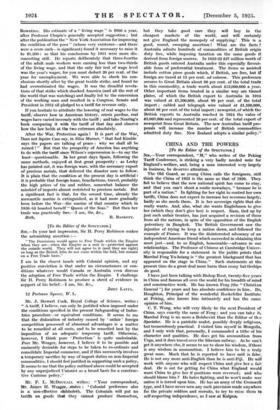[To the Editor of the SPECTATOR.] SIR, —In your last
impression, Sir H. Perry Robinson makes the astonishing assertion :- " The Dominions would agree to Free Trade within the Empire when they are—when the Empire as a unit is—protected against the outside world. They will not agree-to it (and they are right) so long as the British Isles do not come within the fold, but remain on a Free Trade basis."
I am in the closest touch with Colonial opinion, and my
positive conviction is that under no circumstances or con- ditions whatever would Canada or Australia even discuss the adoption of Free Trade within the Empire. I challenge Sir II. Perry Robinson to produce a shred of evidence in JOTIN. LATTA.
Mr. J. Stewart Cook, Royal College of Science, writes : " A tariff, I believe, can only be justified when imposed under the conditions specified in the present Safeguarding of Indus- tries procedure—or equivalent conditions. It seems to me
that the dislocation of industry caused by ' unfair' foreign• competition possessed of abnormal advantages is a matter to be remedied at all • costs, and to be remedied best by the imposition of an adequate temporary tariff. Otherwise, however, I think pure ' Protection ' is quite undesirable.
Pace Mr. Weager, however, I believe it to be possible and eminently desirable for steps to be taken to co-ordinate and
consolidate Imperial commerce, and if this necessarily involves a temporary sacrifice by way of import duties on non-Imperial commodities, I should feel justified in supporting such a policy. It seems to me that the-policy outlined above-could be accepted: by any unprejudiced Unionist as a broad basis for a construc- tive Customs policy."
Mr. -F. L. MeDouGm.t. writes : " Your correspondent, Mr. &Mies V H. Weeps, states : ' Colonial preference also- is a non-effective shibboleth. The Colonials will put no tariffs on goods that they cannot produce themselves2 but they take good care , they will buy in the cheapest markets of the world, and will certainly. not give England the monopoly of supplying.' . This is a good, round, sweeping assertion ! What are the facts ? Australia admits hundreds of commodities of British origin: duty free, while imposing taxation on the same goods if, derived from foreign sources. In 1922-28 £27 million worth Of British goods entered Australia under this especially favour- able form of preferential treatment. The . items so assisted include cotton piece goods which, if British, are free, but if. foreign are taxed at 15 per cent. ad valorem. This preference secures to Great ,Britain about 90 per cent. of the total trade in this commodity, a trade worth about £12,000,000 a year. Other important items treated in a similar way are tinned plates, of which the British export to Australia in 1924 was valued at £1,500,000, about 99 per cent. of the total import ; cabled and telegraph wire valued at £1,100,000, about 98 per cent. of the total import ; newsprint, of which the British exports to Australia reached in 1924 the value of £2,000,000 and represented 50 per cent: of the total export of newsprint from Great Britain. The new Australian tariff pro- posals will increase the number of British commodities admitted duty free. New Zealand adopts a similar Policy."


































































 Previous page
Previous page